
International Journal of Material Forming
Scope & Guideline
Connecting Researchers to Transform Material Science.
Introduction
Aims and Scopes
- Material Behavior and Characterization:
Research focusing on the mechanical properties of materials under different forming conditions, including the development of constitutive models and characterization techniques. - Forming Process Optimization:
Studies aimed at improving the efficiency and effectiveness of various forming processes through optimization techniques, including numerical simulations and experimental validations. - Innovative Forming Techniques:
Exploration of new technologies and methods in material forming, such as additive manufacturing, hybrid forming processes, and advanced tooling solutions. - Numerical and Experimental Methods:
Utilization of computational and experimental approaches to analyze and predict material behavior during forming processes, including finite element analysis and machine learning applications. - Sustainability in Material Forming:
Research that addresses the environmental impact of material forming processes, focusing on energy efficiency, waste reduction, and the development of sustainable practices.
Trending and Emerging
- Additive Manufacturing and Hybrid Techniques:
There is a significant rise in research related to additive manufacturing and hybrid forming techniques, showcasing innovations that integrate traditional processes with additive methods for improved material properties. - Machine Learning and Data-Driven Approaches:
The application of machine learning and data-driven approaches in predicting material behavior and optimizing forming processes is becoming increasingly popular, indicating a shift towards more intelligent manufacturing practices. - Sustainable Manufacturing Practices:
A growing emphasis on sustainability in material forming is evident, with research focusing on reducing waste, enhancing energy efficiency, and developing eco-friendly materials and processes. - Advanced Characterization Techniques:
Emerging themes in advanced characterization techniques, such as in-situ measurement and high-resolution imaging, are gaining traction, facilitating a deeper understanding of material behavior during forming. - Smart Manufacturing Systems:
The trend towards smart manufacturing systems is evident, with research exploring real-time monitoring, feedback control systems, and the integration of IoT in material forming processes.
Declining or Waning
- Traditional Metal Forming Techniques:
There has been a noticeable decline in research focused on traditional metal forming methods, such as simple stamping and forging processes, as newer technologies gain prominence. - Single Material Forming Studies:
Research concentrating solely on single material forming processes is diminishing, with a growing interest in hybrid and multi-material approaches that combine different materials for enhanced performance. - Basic Theoretical Models:
The focus on basic theoretical models without empirical validation is waning, as more studies prioritize integrated approaches that combine theoretical modeling with experimental validation. - Low-Technology Forming Processes:
Interest in low-technology forming processes, such as manual or unautomated techniques, is decreasing as the industry shifts towards automation and smart manufacturing solutions.
Similar Journals

International Journal of Engineering Research in Africa
Empowering Engineering Innovation Across AfricaThe International Journal of Engineering Research in Africa is a pivotal academic resource for researchers, professionals, and students interested in the multifaceted field of engineering within the African context. Published by TRANS TECH PUBLICATIONS LTD, this journal facilitates the dissemination of innovative research, covering a myriad of topics in engineering, from advanced materials to sustainable practices. With an ISSN of 1663-3571 and E-ISSN 1663-4144, this publication not only fosters scholarly communication but also contributes to the global engineering discourse, as evidenced by its current Q3 ranking in the Engineering (miscellaneous) category in 2023. Operating from its base in Switzerland, the journal has been actively publishing since 2010 and continues to play a vital role in the advancement of engineering knowledge, particularly in the African landscape. Although it does not offer an open access model, the journal's commitment to quality research ensures that it remains a valuable asset for those seeking to understand and innovate within the engineering sector. Its integration in Scopus with a rank of #175 out of 307 in General Engineering further underscores its relevance and impact in the engineering community.
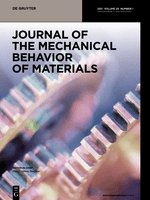
JOURNAL OF THE MECHANICAL BEHAVIOR OF MATERIALS
Advancing Knowledge in Material BehaviorJOURNAL OF THE MECHANICAL BEHAVIOR OF MATERIALS, published by DE GRUYTER POLAND SP Z O O, is a prominent open-access journal in the field of materials science and mechanics, dedicated to facilitating the dissemination of high-quality research findings since 2019. With an ISSN of 0334-8938 and an E-ISSN of 2191-0243, this journal provides a platform for researchers, professionals, and students to explore the mechanical behaviors of various materials, crucial for advancing engineering and scientific applications. The journal's impact is evidenced by its impressive rankings, including Q2 status in both Materials Science (miscellaneous) and Mechanics of Materials as of 2023. With a Scopus rank placing it in the top-half of indexed journals, the JOURNAL OF THE MECHANICAL BEHAVIOR OF MATERIALS is a vital resource for anyone looking to stay at the forefront of material behavior research. Based in Germany, it serves the global academic community while catering to the evolving needs of industry practitioners through its comprehensive open-access model.

Manufacturing Technology
Unveiling the Next Generation of Manufacturing TechniquesManufacturing Technology is a respected journal dedicated to advancing the field of industrial and manufacturing engineering. Published by the Jan Evangelista Purkyne University in the Czech Republic, this journal serves as a vital resource for researchers, professionals, and students interested in the latest developments and technologies in manufacturing processes. With an ISSN of 1213-2489 and E-ISSN 2787-9402, it has carved its niche as a Q3-ranked journal in the 2023 category of Industrial and Manufacturing Engineering on Scopus, showcasing its commitment to high-quality research, evidenced by its standing among the top publications in its field. Although not an open-access journal, it fosters significant academic exchange through its collection of research articles and reviews that span a diverse range of topics. The journal's reach is expanded, having existed for over a decade, with converged years from 2011 to 2024. As manufacturing technologies continue to evolve, Manufacturing Technology remains a key platform for disseminating innovative research, ensuring its relevance and impact within the academic community.
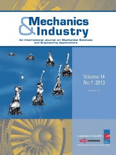
Mechanics & Industry
Transforming Ideas into Industrial SolutionsMechanics & Industry, published by EDP SCIENCES S A, is a prominent open access journal dedicated to the fields of Industrial and Manufacturing Engineering, Materials Science, and Mechanical Engineering. Since its establishment in 2004, the journal has served as a crucial platform for disseminating innovative research and developments in mechanics, catering to a diverse audience of researchers, professionals, and students worldwide. With an ISSN of 2257-7777 and an E-ISSN of 2257-7750, the journal is indexed in Scopus and has achieved a respectable Q3 quartile ranking across its categories for 2023. Mechanics & Industry emphasizes the importance of collaborative research and the sharing of knowledge, underpinning advancements in technology and industry practices. The journal's commitment to open access ensures that research findings are available to all, promoting sustainability and innovation within the global engineering community. Located in Les Ulis, France, this journal continues to uphold high standards of scholarly excellence and relevance in an ever-evolving industrial landscape.

MANUFACTURING ENGINEERING
Transforming Ideas into Manufacturing ExcellenceManufacturing Engineering is a pivotal journal specializing in the fields of Industrial and Manufacturing Engineering, as well as Mechanical Engineering, with a rich history of publication since its inception in 1975. Published by the esteemed Société des Ingénieurs de Fabrication (SME), this journal plays a crucial role in disseminating innovative research, practical applications, and emerging technologies that shape the manufacturing sector. Despite its recent positioning in the Q4 quartile rankings on Scopus, the journal serves as a platform for rigorous peer-reviewed articles that contribute to the academic dialogue and bolster advancements in manufacturing practices. The journal operates without open access options, making it an essential resource for institutions and professionals looking to stay informed within the manufacturing domain. With a dedicated audience comprising researchers, engineers, and industry professionals, Manufacturing Engineering continues to address the evolving challenges and opportunities in manufacturing, fostering an environment ripe for collaboration and exploration.

Transactions of the Canadian Society for Mechanical Engineering
Fostering Innovation and Collaboration in Mechanical EngineeringTransactions of the Canadian Society for Mechanical Engineering, published by Canadian Science Publishing, stands as a pivotal journal within the field of Mechanical Engineering, boasting an ISSN of 0315-8977 and an E-ISSN of 2816-5691. With a history extending back to 1972, this journal serves as a critical platform for disseminating cutting-edge research, reviews, and innovative applications that advance the discipline. Ranked in the Q3 Quartile for Mechanical Engineering and holding a Scopus rank of #372/672, it reflects a robust academic quality that seeks to engage researchers, professionals, and students alike. While currently not offering open access, the journal is committed to enhancing the visibility and exchange of knowledge pertinent to mechanical engineering challenges and breakthroughs occurring both in Canada and globally. Researchers are encouraged to contribute their findings to foster collaboration and development within this vital area of engineering.

Frattura ed Integrita Strutturale-Fracture and Structural Integrity
Pioneering Research in Fracture MechanicsFrattura ed Integrita Strutturale - Fracture and Structural Integrity is a prominent open-access journal published by GRUPPO ITALIANO FRATTURA since 2007, dedicated to advancing the fields of Civil and Structural Engineering, Mechanical Engineering, and Mechanics of Materials. With an E-ISSN of 1971-8993, this journal has established itself as a significant platform for researchers and practitioners in the engineering community, offering an accessible outlet for high-quality research and innovative methodologies. The journal has achieved impressive standings in the Scopus ranks, notably being positioned in the second quartile (Q2) across its relevant categories in 2023, indicating its growing influence and the quality of the research it disseminates. With a publishing scope extending from 2011 to 2024, Frattura ed Integrita Strutturale continues to be an invaluable resource for addressing the mechanics of material integrity and fracture phenomena, inviting contributions that advance understanding and foster multidisciplinary dialogue. By prioritizing open access, the journal ensures that vital research is readily available to a global audience, enhancing collaboration and knowledge sharing among academia and industry alike.
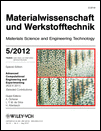
MATERIALWISSENSCHAFT UND WERKSTOFFTECHNIK
Unraveling the Mysteries of Material Properties.MATERIALWISSENSCHAFT UND WERKSTOFFTECHNIK, published by WILEY-V C H VERLAG GMBH, is a prominent journal dedicated to the field of materials science and engineering. With its ISSN 0933-5137 and E-ISSN 1521-4052, this journal serves as a vital resource for researchers and professionals engaged in exploring the intricate relationships between the properties of materials and their applications. Established in 1970 and continuing through 2024, the journal has been consistently recognized in various categories, achieving a Q3 ranking in 2023 across Condensed Matter Physics, Materials Science (miscellaneous), Mechanical Engineering, and Mechanics of Materials. Although it does not offer open access, its high-quality peer-reviewed content is fundamental to the advancement of knowledge within its three key areas: novel material development, material characterization, and application of materials in engineering contexts. As a driving force in the scientific community, MATERIALWISSENSCHAFT UND WERKSTOFFTECHNIK continues to cater to the curiosity of aspiring students, seasoned professionals, and researchers alike, facilitating a deeper understanding of the complexities of material technology.
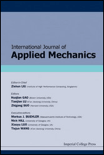
International Journal of Applied Mechanics
Pioneering Research for a Dynamic Engineering LandscapeThe International Journal of Applied Mechanics, published by World Scientific Publishing Co Pte Ltd, is a premier platform that serves the fields of materials science, mechanical engineering, and mechanics of materials. Located in Singapore, this journal has established itself as a crucial resource for researchers, professionals, and students, with its convergence of scholarly work from 2009 to 2024. Ranked in the Q2 category across notable disciplines, including Materials Science, Mechanical Engineering, and Mechanics of Materials, it reflects a strong commitment to publishing high-quality research that pushes the boundaries of knowledge in applied mechanics. Despite being a non-open access journal, its successful Scopus rankings, including an impressive rank of #151 in Mechanical Engineering, signify its substantial impact and recognition within the academic community. This journal not only aims to disseminate pioneering research but also to foster collaboration and innovation in the rapidly evolving landscape of applied mechanics.
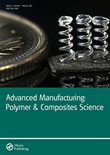
Advanced Manufacturing-Polymer & Composites Science
Unlocking the Potential of Composites in ManufacturingAdvanced Manufacturing-Polymer & Composites Science, published by Taylor & Francis Ltd, is a prominent open-access journal dedicated to the cutting-edge fields of polymer and composite materials in advanced manufacturing. With an ISSN of 2055-0340 and an E-ISSN of 2055-0359, this journal has been providing researchers, professionals, and students critical insights since its inception in 2015. The journal is characterized by its pivotal role in disseminating high-quality research that intersects with crucial areas such as Electrical and Electronic Engineering, Management of Technology and Innovation, and Polymers and Plastics, as indicated by its Q3 and Q2 rankings across these categories in 2023. In addition, it has established a significant presence in Scopus rankings, reflecting its contribution to the academic community with specific ranks in the top half of its fields. Recognizing the importance of open access, the journal fosters wider dissemination of knowledge, allowing global access to groundbreaking studies that influence both research and practical applications. Operating from the United Kingdom, Advanced Manufacturing-Polymer & Composites Science continues to pave the way for innovation and collaboration in the field, making it an essential resource for anyone involved in materials science and engineering.